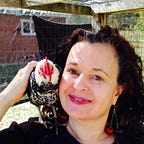“Yes, and…”
Conflicted Feelings Don’t Mean You Made The Wrong Decision
I love the concept of “yes, and.” It’s fairly new to me as I am stubbornly slow about giving up old thinking patterns but now that I’ve integrated it, I have found it to be so helpful.
“Yes, and…” is the idea that two things that seem to contradict each other can be simultaneously true. For example, you may be immensely glad to have a person who caused you harm out of your life, and you may miss them and your connection. You’re grateful that you cut off interactions with a friend who did not have your best intentions at heart; you also miss her and the fun times you once had together. Yes, and… Yes, I’m glad and yes, I’m sad. It probably happens more in your life than you realize. Traveling for the first time by yourself: Yes, I’m excited and yes, I’m scared. Trying something new and being vulnerable: Yes, I’m proud and yes, I’m kind of embarrassed. I think all of us have experienced something like that push-and-pull.
This concurrent, incongruous state may seem to undermine both but making peace with the fuzziness of life rather than insisting on distinct, clean separations has made it easier for me to know that choppy waters are to be expected with change instead of running away when things feel uncomfortable and unsteady.
Being able to appreciate nuance in life’s events and interpreting them with more maturity and generosity has been an emotional life-preserver for me over the past few years. Maybe it comes with age — I’m in my mid-50s now — but it’s also been something I’ve had to actively cultivate as it has been a very useful tool in lessening my anxiety and improving my state of mind.
“Yes, and…” allows me more breathing room compared to the open-and-shut edicts I once issued when interpreting life and making my decisions, which means it can be much more gray at times — there is little as satisfying as an open-and-shut situation that you can just close the book on — but it means that I also allow myself grace if I am struggling with some of the good decisions I have ultimately made, understanding that life is complicated and we are not AI-generated simulacrums of humans. (Unless you are. It’s so hard to tell these days. Look at your hands to tell.)
I thought of veganism in this context of “yes, and” recently and I think it’s a helpful way to maybe conceptualize some challenges, especially in the early days and months of your transition as well as help those who are experiencing difficulties.
Even the most beneficial choices and changes can come with a sense of loss, regret and fear, sometimes a very deep sense. Sometimes these decisions to grow and change are a gloriously gratifying slam dunk, whoosh, nothing but net. Other times, well, there are strands and fragments of intricacies that we get twisted up in and this is also part of the human experience.
Here is an example: I remember that weird gray time after my son was born. I love my son more than I could describe but having him meant being honest about the loss I also experienced at this time of so much expansion — the loss of many freedoms, the loss of having my husband just to myself, the loss of just living my own life. I wouldn’t have traded the joy of my son for anything, but it was important for me to not gloss over the losses so I could be fully present and honest.
Veganism might be analogous in some ways. I believe that aside from taking a chance on that nice guy I ended up marrying, it was the best decision I ever made. That doesn’t mean it was free of contradictory feelings and difficult closures, though. It meant I was changing some traditions, I wasn’t as easy to accommodate with my friends, I would never be able to eat my grandmother’s Spry cookies again. Was this the end of the world? Of course not, but feeling like I was losing those little connections was bittersweet to say the least. (There weren’t good alternatives and options like what we have today.) It felt selfish to even think about such things, and it was, but it was also reality and who are we to deny reality?
Given that, I’d say it’s wise to not only consider clear-headed, confident decisiveness as being the correct decision, but also interpret complicated feelings as an indication that you made a mistake. These may just be the choppy waters and stages of navigating change. The nuances of changing and evolving without a linearity or likely time frame can mean that you may feel uneasy and conflicted about old ways as part of your growth. This will subside. You may also have a little tenderness and sadness as part of leaving something behind you always. There are people, happy memories, traditions and comforts we must leave behind, put to the side or adapt when we grow, even if it takes multiple setbacks, which are a natural, expected part of the behavior change process. (By the way, if you want to treat yourself with understanding and self-compassion while working through a setback, this article offers helpful guidance rooted in psychology and research.)
Using the framing of “yes, and…” — that things can be contradictory simultaneously and still true — as part of understanding behavior and emotional growth is not only helpful and kind to yourself, it sets realistic expectations that allow you room to feel uncomfortable and conflicted without feeling like a failure as you move in the general direction of better.
Marla Rose is cofounder of VeganStreet.com.
